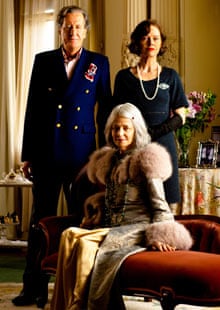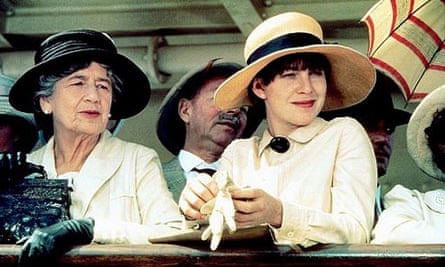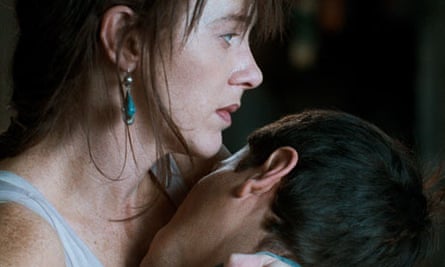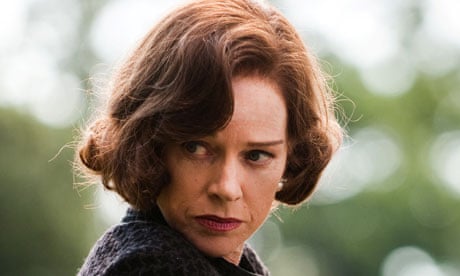Judy Davis sounds vaguely discombobulated when she picks up the phone. The 58-year-old actor is at home in Sydney on a Friday evening. What have I interrupted? "Oh, nothing," she sighs. "I was just tidying." She asks how I am. I tell her I just got up (it's the time difference), and she sighs again and says: "Oh God."
Anyone who knows Davis's work will appreciate the disdain she can bring to a simple exhalation. Withering contempt is her on-screen stock-in-trade; her repertoire for expressing it includes an array of tics and twitches, a drop-dead stare and a temper seen to blistering effect in some of her films for Woody Allen, including Husbands and Wives and Deconstructing Harry.
A few directors have witnessed that temper up close, among them David Lean, with whom she made A Passage to India, and George Sluizer, whose relations with her during Dark Blood (River Phoenix's last film) were so dire that producers had to intervene.
As it happens, she is in a fine mood as we discuss The Eye of the Storm, her new film. Adapted from Patrick White's novel, it tells of a monstrous dying matriarch (Charlotte Rampling) whose two adult children, Basil (Geoffrey Rush) and Dorothy (Davis), have returned to the family estate to see how the old gal's wealth will be carved up. The big, sad joke of the film is that Basil and Dorothy never really got a childhood, so they're having it now. Davis gives her character a bone-clacking, head-wobbling walk; she is fragile as well as brittle, pulling rank on the help one minute and clinging to "Mummy" the next.
"I felt she was a centreless person," she explains. "That's tricky because it can look to the audience as though the actor hasn't discovered the centre. But this was the decision I made. She doesn't know who she is. She's probably got arrested development." Her voice is languorous but punctuated by the odd harshly stressed word. A hacking cough intervenes now and then: hacking in the literal sense, as though she keeps breaking from our conversation to chop wood.

She needs no coaxing to discuss what she considers to be the film's flaws. "The mother should be read as quite ancient, and of course Charlotte Rampling is still a beautiful woman. If I walked into a cinema and saw this, I'd probably think her children were …" She gives a snorting laugh. The axe of her cough falls again. "Let's say, 'a touch old'. There's a decade between Charlotte and myself. That's pushing it for believability."
I mention that she has an executive producer credit on The Eye of the Storm. "Oh, Geoff and I have the same agent. He got executive producer so I did too. I thought: 'Woo-hoo! Here I go!'" The line crackles with laughter. "Sadly, it didn't mean much. The only thing that means anything is power and it didn't give me that." Does she want power? "I'd like to be able to hold my own in a room and say: 'I hear what you're saying. But I think it has to be this way.' Wouldn't that be wonderful? Oh, that would be wonderful! I'd be kind with it. I'm sure there are actors who have that power but I'm not one of them. I don't even have it with my own children."
I'm slightly taken aback. Perhaps it's naive to assume that talent is converted into on-set currency. But any assessment of the bravest, fiercest film actors of the past few decades would have to include Davis. She could not have wished for a more eloquent statement of intent than her breakthrough performance as the bolshy, budding writer in Gillian Armstrong's 1979 My Brilliant Career. That film launched her, but it also shaped her screen persona as the anti-ditz, the smart cookie laced with arsenic. Her discernment has deserted her only once, when she played the villain in the dumb 1982 SAS thriller Who Dares Wins. Even there she brought scrupulous intelligence to the part. It's just that it was rather like bringing an Uzi to a paintballing game.
Davis worked largely in Australia throughout the 1980s, often alongside her husband, Colin Friels. "The Australian film industry was in its infancy and everybody was a beginner. The young screenwriters possibly needed to have chalked up a few miles before they could deliver really workable scripts." In 1984, she received an Oscar nomination for her performance as Adela, whose assault sparks an Anglo-Indian scandal, in A Passage to India. It would be a shame if her nuanced work in that film were overshadowed by her contretemps with its director. But there you go; it probably has been. About David Lean she strikes a cool, even amused, note.

"He was a frightening, Lear-like figure. He came with this enormous reputation but he wasn't at the height of his physical powers, and I think he carried a lot of tension because of that. I perhaps didn't appreciate that fully at the time, probably because I was overly aware of my own inadequacies. So when David tensed up, I tensed up. I've never been very good at being snapped at. I went into self-defence mode." I wonder how that atmosphere affected her. She considers this for a moment. "It was endlessly fascinating watching Lean and the turmoil he was in. How he tried to dig himself out of it. Entire days' filming would be cancelled because he'd decide the set needed to be re-dressed. Obviously he simply didn't feel ready to shoot that day. It was all very … interesting."
She has no such psychological insight to bring to Dark Blood, in which she is wise and funny as a woman stranded in the desert and drawn to the young hermit played by River Phoenix. Nik Powell was a producer. "It was a clash of temperaments between George Sluizer and Judy," he says. "There's nothing you can do. You just try to calm them both down, give them perspective. River's fans won't like me for saying this but I think it's Judy's performance which is phenomenal and full of energy. Maybe from the clash of temperaments came that performance."
Sluizer has cut together a version of Dark Blood, despite only 80% of the movie being completed. At the world premiere last September, he described Davis as "a cold person but a brilliant actress". She calls him "odd" and expresses distaste for the whole enterprise. "I can't imagine what he could have cobbled together. What would be the interest in an unfinished film, other than a rather questionable curiosity in River? I don't care personally." Cough. "Makes no difference to me."

It was only shortly before Dark Blood, which was shot in 1993, that she had begun to trust film-makers at last. This coincided with a string of work for great directors: Cronenberg's Naked Lunch, the Coen brothers' Barton Fink, Allen's Husbands and Wives. "When I started I was so hyper-self-conscious, so horrified that what I was doing would be committed to film with somebody else controlling it. What eased those fears is working with people like David Cronenberg and Woody Allen. The film is their creature. They know what they're doing. That's when I found it doesn't have to be a catastrophe."
Admirers of her frantic, electrified turn as a newly single woman in Husbands and Wives may be shocked to hear that she can't watch herself in that movie. "I think it's a great film. Except for the bits I'm in." I protest that it's a daredevil performance, ricocheting between comedy and devastating despair. "Oh no," she argues back. "I was slightly over the top." She gives "slightly" a sarcastic flatness. "There's that golden rule that you don't want to see the acting. And I thought I could."
Wasn't that the way she was directed? "Definitely not. Nah. Nope. He just let me go. We can't blame Woody Allen for that one." I tell her there's no need to blame anyone but she's not having it. She worked with Allen for the fifth time recently, on the frothy To Rome with Love ("Haven't seen it"). She was surprised, though, to find that no credit had accrued. "I went in thinking, 'Oh, we have a kind of relationship.' And of course I discovered that I didn't have any relationship with him at all. It may have been easier if I'd never worked with him! I thought: 'Ah. I've made a bit of a mistake here.'"
Davis is sanguine about her occasionally fraught on-set encounters: "It's always an act of faith. Sometimes it works, sometimes not. Rich, powerful actors have minders to protect them. I've never had that. It's just me walking into that zone. I've got children, I've got to make a living. And I have at times found myself in situations I'd have preferred not to be in."
Earlier in our conversation, she had mentioned the 1970s Australian actor Helen Morse, whom she had described as "a reluctant star". Could that tag be applied to Davis, too? Another sigh. "I never wanted celebrity. It's not a game I've ever been interested in. My life leads my work, and I wouldn't want it to be the reverse." Cough. "Does that answer your question?"

Comments (…)
Sign in or create your Guardian account to join the discussion